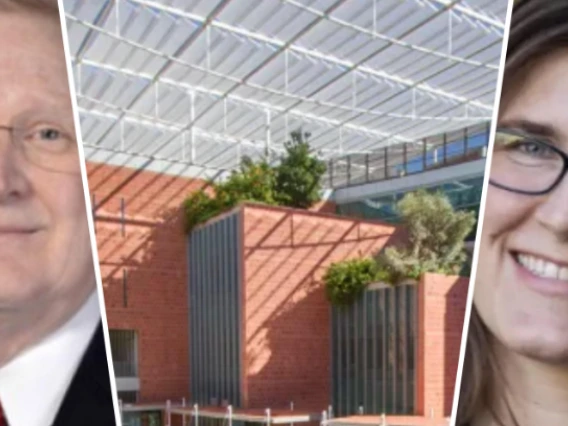Researchers & Research
With $954 million submitted in FY23 for research activities, we are tackling the most pressing and complex challenges of our time, from climate change to planetary defense, and pandemic preparedness to the long-term health of our troops.
Research conducted by University of Arizona scientists already fortifies many aspects of national defense and has the potential to contribute much more to the field.
The university’s research and development capacities are on excellent footing:
- Ranked in the top 4% of public universities in research and development, with total funding reaching $954 million in 2023
- Cleared to work with Top Security and Sensitive Compartmented Information (TS/SCI)
- Home to the nation’s largest optical sciences program
- No. 1 in astronomy and astrophysics
- No. 6 in NASA-funded activity among public universities
- No. 7 in physical sciences
- No. 28 among worldwide universities granted U.S. utility patents, with 615 as of 2023
- 2,753 invention disclosures as of 2023
UARIZONA RESEARCHERS IN THE NEWS
UA HILL UPDATE FOR Q4 2023
Read in PDF:
Space
Breakthrough discoveries are highlighting the importance of continued investment in space missions. The National Aeronautics and Space Administration’s University of Arizona-led OSIRIS-REx mission collected sample material from the 4.5-billion-year-old asteroid Bennu that showed evidence of water and high-carbon content and have started studying the sample. Dante Lauretta (Principal Investigator, OSIRIS-REx, Regents Professor) shared that Bennu may offer insight into the origin of life with The Washington Post.
- The Washington Post: Asteroid pieces brought to Earth may offer clue to life’s origin
Vishnu Reddy (Space4 Center Director and Professor of Planetary Sciences in the Lunar and Planetary Labs) and his Space4 team identified errant space junk that crashed into the Moon, providing definitive proof that the object was a booster from a Chinese space rocket.
National Security
As the Biden Administration and Congress focus on improving the nation’s domestic critical minerals supply and reducing foreign reliance, Kray Luxbacher (Department Head and Professor of Mining and Geological Engineering) and Lynndy Smith (Co-founder and President of Arizona Defense & Industry Coalition (AZDIC)) co-authored an Arizona Daily Star op-ed outlining how federal support and mining reform can foster a new generation of mining talent and advance greener mining practices, and how Arizona can serve as a mining blueprint for other states.
Additionally, the University of Arizona and AZDIC are partnering on an initiative to aid in the reconstruction of Ukraine, with Sharon Megdal (Director of Water Resources Research Center) and Kim Ogden (Department Chair, Chemical and Environmental Engineering) leading projects to rebuild the country’s energy systems and infrastructure to ensure resiliency and sustainable, high-quality water systems.
- Arizona Daily Star: Local opinion: States need US help to reach mining potential
- KOLD-TV: Tucson helps rebuild Ukraine
Emerging Science & Tech
Following the Biden Administration’s Executive Order (EO) on AI, Arthur “Barney” Maccabe (Executive Director of the Institute for Computation and Data-Enabled Insight) outlined why academia and professional societies should play a key role in AI regulation and how the EO will influence the development of AI with Federal News Network, and 2024 AI predictions with Route Fifty.
- Federal News Network: All right, the White House has spoken on AI. Now what?
- Route Fifty: After an action-packed year, 2024 will be another blockbuster year for AI
Additionally, the University of Arizona’s College of Engineering was recently awarded $35.5 million by the Arizona Commerce Authority to create a facility to support semiconductor, computer chips, optical devices and quantum computing research, further advancing the institution’s role as a semiconductor leader.
Health
To help alleviate the nation’s opioid epidemic, the University of Arizona announced a Methadone Patient Access to Collaborative Treatment (MPACT) study to develop a medical intervention tool to address gaps in current treatment for opioid use disorder. Funded by a $1 million grant from the National Institute on Drug Abuse, Beth Meyerson (Professor, Director of the Harm Reduction Research Lab in the Department of Family and Community Medicine) will lead efforts to develop a methadone treatment protocol in Arizona that can be replicated in other states.
Environment
As record heat stifled the globe this year, Ladd Keith (Assistant Professor of Planning and Sustainable Built Environments) continues to serve as a leading authority on extreme heat and heat resilience. He recently spoke with Grist about how heat can affect anyone, particularly young people and those in good health.
The National Institutes of Health (NIH) awarded the University of Arizona’s Mel and Enid Zuckerman College of Public Health’s Southwest Center on Resilience for Climate Change and Health (SCORCH) $3.8 million to advance research at the nexus of extreme heat and health to help identify the impact on vulnerable communities.
Other News/ Reports
Space
- UArizona launches Arizona Astrobiology Center to unlock the mysteries of life in the universe, UArizona News
- UArizona researchers are part of NASA’s next astrophysics mission, UArizona News
- OSIRIS-REx flies on as OSIRIS-APEX to explore a second asteroid, UArizona News
- Astronomers detect life ingredient on the edge of the galaxy, Independent
- ‘Planet killer’ asteroid are hiding in the sun’s glare. Can we stop them in time?, LiveScience
National Security
- University of Arizona’s new school addresses critical need for minerals and mining talent, Mining.com
- UArizona digs into virtual reality mining: ‘The possibilities are endless’, KGUN-TV
- Mining Arizona's hidden treasure, UArizona News
Emerging Science & Tech
- The Mind of the Inside Attacker, InformationWeek
Health
- UofA College of Medicine awarded $1.5M grant from the US DoD Army Medical Research division to create a portable virtual reality device to quickly assess traumatic brain injuries, UArizona News
- Researchers examine the relationship between loneliness and being alone, UArizona News
- Less snacking, more satisfaction: Some foods boost levels of an Ozempic-like hormone, NPR
- $13M NIH grant funds research to rejuvenate immune system in older adults, UArizona News
Environment
- UArizona researchers help author the Fifth National Climate Assessment, UArizona News
- Indigenous Resilience Center receives $2 million grant from Waverley Street Foundation, UArizona News
- 'Different hats': Indigenous women play a growing role in managing the Colorado River, AZ Central



